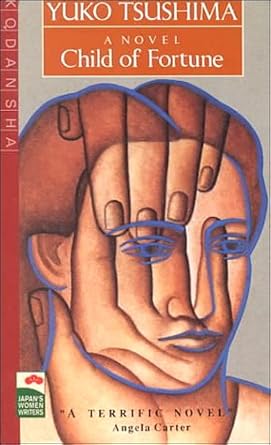Yuko Tsushima's Child of Fortune/Choji was published in 1978 and won the Women's Literature Prize, it's a novel I've been meaning to read for a while. Published by Kodansha in 1983, the paperback edition features artwork by Sandra Dionisi, Child of Fortune was translated by Geraldine Harcourt, who also translated Tsushima's The Shooting Gallery, a collection of short stories and the novel, Woman Running in the Mountain, speaking in her introduction about Woman Running in the Mountain of it's 'minute dealing of the heroine's daily grind' which makes it 'accessible and yet demanding', the same could be said to a certain degree of Child of Fortune, there's not a great deal of straight forward dialogue, instead Tsushima's prose goes into exploring the thoughts and reflections of the leading character Koko Mizuno, at the beginning of the novel the narrative dips in and out of episodes from her history and past relationships, episodes in the story in present tense lead to memories of past events. Her daughter Kayako, whose about to take her high school entrance exams, stays predominately with her Auntie Shoko, visiting her mother just on Saturday nights, and as the narrative progresses, Koko's character and situation is slowly unveiled. She divorced from her husband Hatanaka, the reason remains uncertain, just mismatched, she tells Kayako that he's going far away, but after a while through a friend, Osada, it's arranged so that Kayako stays in contact with her father. Koko teaches piano at a music store, and through the stories of her past we learn that she had relationships with Osada and also Doi, a married man. Through this excellent translation we get a good picture of Tsushima's controlled prose, depicting Koko's experiences as a single mother, in her late thirties, defiantly independent, her sister looks after Kayako, thinking that Koko is an inadequate parent, Koko striving to live her life the way she wants, Koko is exposed to the pressures of not conforming to what society regards as the ideal mother.
The story line from the past and the one in the present tense merge when it's revealed that Koko is pregnant with Osada's child, and at first she doesn't tell anyone, hiding the pregnancy, letting people think that she's just putting on weight. Koko struggles with whether she should go through with the pregnancy or not, weighing up how Kayako will react, she had an abortion before when she became pregnant with Doi's child, and on a spurr of the moment decision she gets a taxi to the doctor's surgery, but when she gets out she feels movement in her stomach. Changing her mind she decides to go to Shoko's house and announce that she's pregnant, and to raise the child on her own. But when she arrives, and talking over another matter, Kayako ends up shouting at her mother and storms out of the house. The novel opens with Koko dreaming of an ice mountain, 'cold and abrupt, it wouldn't allow her emotions free play like any ordinary dream', and Koko's dreams figure quite largely in the novel, events slightly recognised, along with memories of her life as a younger girl, and her relationship with her brother, who was born retarded and eventually succumbs to pneumonia. She phones Osada intending to tell him that she's pregnant, but can't find the courage to tell him, but he calls around to her apartment the following day, and discovers for himself, Koko is on her way for her first check up at the hospital. The results of the doctors examination are surprising and show again the subconscious pressure that Koko has been enduring.
Yuko Tsushima, daughter of Osamu Dazai, has won many literary prizes for her fiction, including the Tanizaki Prize and the Noma Prize.The Silent Traders, which shares themes similar to those found in Child of Fortune, won the Kawabata Prize, is a story centred around a family visit to Rikugien, and a meeting between an estranged father and his children, told from the mother's perspective, can be found in the collection The Shooting Gallery.

3 comments:
I have added her The Shooting Gallery and this book to my TBR list-thank you for bring this wonderful sounding book to our attention
I have a feeling I'm going to discover a lot of new and important Japanese writers through your blog. Thanks for expanding my literary horizons.
The three of Geraldine Harcourt's translations that i have read here have all been really engrossing reads,many thanks for visiting and commenting.
Post a Comment